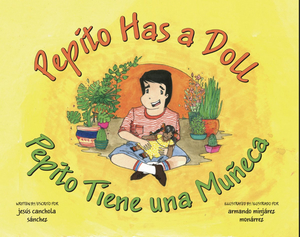LGBT+ Bilingual Children's Story PEPITO HAS A DOLL Set to be Released
Pepito has only one friend, his doll Lola, until Miguel appears and they begin a joyful adventure together.

Releasing Jan. 20th, Pepito Has a Doll is centered on the experience of a shy young boy who lives with his grandmother. Pepito has only one friend, his doll Lola, until Miguel appears and they begin a joyful adventure together. Bilingual in English and Spanish, this story is an opportunity for families to discuss traditional gender roles and same gender attraction. As more and more of the children's book industry is incorporating LGBT characters, rarely do they feature families of color.
Check out a promo video!
Available for pre-sale.
Pepito loves his doll Lola. She's his only friend. He takes her to school in secret because his schoolmates will make fun of him. He's shy. The other kids at school don't play with him. Every night he prays to find a friend at school. One day a new student arrives at Pepito's school, Miguel. Find out if Pepito and Migues become friends in this charming story of a boy and his doll.
Jesús Canchola Sánchez had his first short story published at the age of 7 in his Chicago elementary school newspaper. He made his film feature debut as writer/director with the movie Bittersweet Waters. Pepito has a doll is his first children's story. Jesús was a boy who played with dolls. More details can be found here: https://www.bittersweetwaters.com/cast-crew
WRITER'S COMMENTS
On Dolls:
I grew up playing with dolls in secret. My abuela was the only one who allowed me to play freely without prejudice. My family was conservative and did not believe it was appropriate for a boy to play with dolls. I didn't understand that. All I knew was that it was fun to dress up dolls and do their hair. I'm grateful for my grandmother's openness in allowing me to play without judgment. One of my favorite dolls was named Lola which is why I named Pepito's doll with the same name.
Pepito Has a Doll/Pepito Tiene Una Muñeca is inspired by the freedom that I felt when playing with my dolls. The children that bully Pepito in the story, in a way, represent my family members who did not allow me to play with my dolls when I was growing up. Their intolerance was frustrating. I was caught a few times and the dolls were taken away. I cried, but my grandmother always got them back for me or bought me new ones. She was my fierce protector as a child. I wrote a special thank you to my grandmother in the book because I would not be the man I am today if it had not been for her unconditional love.
On Children's Stories:
I love children's stories. They had such an impression on me and where I began to understand the power of story. I would read everything from Curious George to Bible stories when I was little. My imagination grew because of my exposure to these stories. I still read children's stories today. As a writer, it has always been a dream of mine to write my own story for a young audience. While researching children's books that address nontraditional gender stereotypes, I fell in love with William's Doll by Charlotte Zolotow. It's from 1972. I have been especially inspired by those first brave stories that made it into the mainstream that addressed difference in a positive way. We still need these stories today. There are still communities who feel it's wrong for a boy to play with dolls. As a writer, I wanted to address that through Pepito- who is me when I was seven years old.
I met Armando (the illustrator) while doing work with undocumented immigrants in Kansas and we became friends. He was also a boy who grew up playing with dolls. I proposed the project to him because I respect his work as an artist. He agreed to go on the adventure with me and we started working. We workshopped it on and off for a couple of years. Pepito Has a Doll/Pepito Tiene Una Muñeca is our baby. We are proud co-parents.
Comments
Videos

